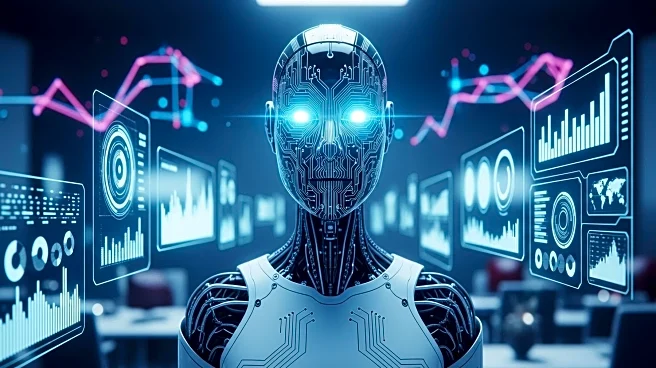What is the story about?
What's Happening?
Meta's Metaverse team has been instructed to increase their productivity fivefold by integrating artificial intelligence into their daily operations. Vishal Shah, Meta's VP of Metaverse, emphasized the importance of making AI a habitual tool rather than a novelty. This directive comes as Meta shifts focus from its previously hyped Metaverse project to AI initiatives. The company has invested heavily in AI, building data centers and recruiting talent from competitors. Mark Zuckerberg, Meta's CEO, has indicated that AI will play a central role in the company's future, with expectations that AI agents will significantly contribute to research and development. The integration of AI is expected to affect not only engineers but also project managers and designers, encouraging rapid prototyping and innovation.
Why It's Important?
The shift towards AI signifies a strategic pivot for Meta, potentially revitalizing its Metaverse project through enhanced productivity and innovation. This move could impact the tech industry by setting a precedent for AI integration in corporate workflows, potentially influencing other companies to adopt similar strategies. The emphasis on AI could lead to increased efficiency and reduced operational costs, benefiting Meta's bottom line. However, it also raises questions about the future of the Metaverse and whether AI can fulfill the ambitious goals initially set for it. Stakeholders in the tech industry, including competitors and investors, will be closely monitoring Meta's progress and the broader implications of AI-driven productivity.
What's Next?
Meta plans to have 80% of its Metaverse employees using AI in their daily routines by the end of the year. This initiative is expected to lead to a significant increase in productivity and innovation within the company. As AI becomes more integrated into Meta's operations, the company may explore new applications and developments in the Metaverse, potentially leading to a resurgence of interest in virtual and augmented reality platforms. The success of this strategy could influence other tech companies to adopt similar AI-driven approaches, potentially reshaping industry standards and practices.
Beyond the Headlines
The integration of AI into Meta's operations could have ethical and cultural implications, particularly concerning the displacement of traditional roles and the reliance on automated systems. As AI becomes more prevalent, there may be concerns about job security and the need for reskilling employees to adapt to new technologies. Additionally, the focus on AI could lead to discussions about data privacy and the ethical use of AI in corporate settings. Long-term, this shift could influence how companies approach innovation and productivity, potentially leading to a reevaluation of work practices and employee expectations.
















